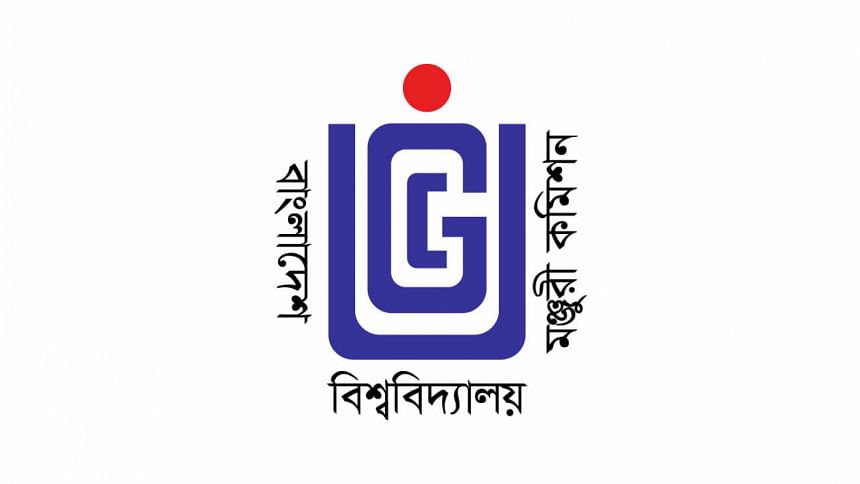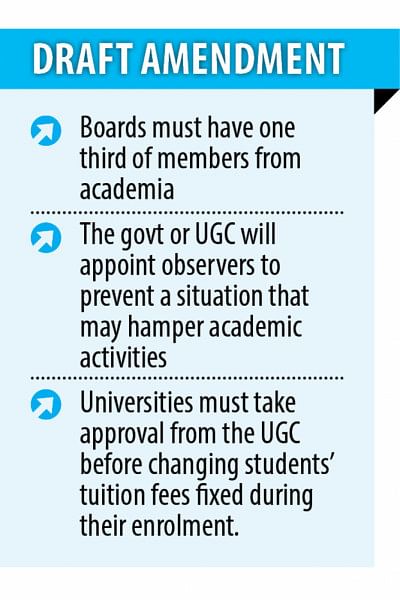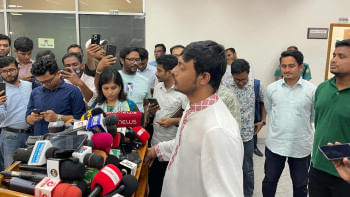Private Universities: Changes in law to streamline trustee boards


At least a third of the trustee board members of a private university will have to be academics, according to a draft amendment to the Private University Act-2010.
Under the existing law, a private university can have nine to 21 members in its trustee board. The proposal to have a third of the trustee members from educationists is aimed at creating a congenial academic atmosphere at the private institutions, said officials of the education ministry and University Grants Commission.
The draft proposes that a trustee will not take financial benefits for attending any meeting as well as for other university-related activities. Also, the trustees and their family members will not hold any offices of profit at a university, it says.
The other major changes in the draft include empowering the government or the UGC to appoint observers at private universities if there arises any situation that may hamper academic activities.
A five-member committee led by UGC member Professor Biswajit Chanda prepared the draft and submitted it to the education ministry. The committee was formed by the ministry following a recommendation from the parliamentary standing committee on the ministry.
"The new amendments aim to bring more transparency to running non-government universities," Biswajit Chanda told The Daily Star on Thursday.
Explaining the reasons for amending the existing act, the draft says, "It is a matter of concern that the trend of corruption, nepotism, and academic, financial and administrative irregularities at private universities has increased alarmingly in recent times."
It says empowering universities as well as the UGC, and enforcing laws strictly is necessary to establish good governance at private universities.
The Secondary and Higher Education Division of the education ministry is likely to hold an inter-ministerial meeting on Tuesday to finalise the draft, said Abu Yousuf Miah, additional secretary of the ministry.
Currently, there are 112 private universities in the country. The first private university was established in 1992 through a law, which was amended in 2010 to meet a growing demand for higher education.
ACADEMICS AND OBSERVERS
According to the draft, there will be no change in the trustee board of a private university without UGC recommendation and government approval. If needed, the UGC or the government can appoint observers at the universities.
Academics at the trustee board will be able to play a positive role in enriching academic atmosphere and research of the university, said Biswajit.
"Appointment of observers will take place only when the university administration faces a crisis period, or is marked by a lack of order, or on the brink of closure. On many occasions, the authorities appoint observers in banking and other sectors," he added.
UGC and education ministry officials say many universities have virtually turned into family businesses. "If a third of trustee members are academics, there will be a balance at the board. It will also reduce the chance of corruption," an UGC official said, wishing not to be named.
UGC officials have pointed out that on many occasions the "profiteering attitude" of trustees created a "non-congenial" academic atmosphere. They have said most of the trustees at private universities are businessmen and politicians, and that some of them are educationists.
"I think the decision of having more academics at trustee boards is a good one. That trustees cannot hold offices of profit is also positive. Many trustee board members do not act responsibly; they want to take some benefits," said former UGC chairman Prof Nazrul Islam.
Contacted, Association of Private Universities of Bangladesh (APUB) Chairman Sheikh Kabir Hossain said, "If the educationists invest in the university, there are no objections regarding the matter. They themselves can invest or the government can invest on their behalf."
About the appointment of observers, he said observers are usually appointed in companies when they face losses.
"But private universities are non-profit, there is no reason to appoint observers at these institutions. Each university has a syndicate with representatives of the chancellor and the UGC, who act like observers," Hossain said.
Usually, trustee board members do not take a sitting allowance. Trustees and their families should not hold offices of profit at universities as it is a conflict of interest, he added.
MORE SPACE, MORE RESERVE FUND
The draft amendment proposes that a private university will get approval if it has an area of at least one lakh square feet, whether owned or rented. Currently, a private university can have approval if it has at least a 25,000 square feet space.
It says a private university should have at least five acres of land to establish a permanent campus. But this provision will not apply to universities that were set up before the proposed amendments are enacted. Currently, a university needs at least one acre of land for permanent campuses in Dhaka and Chattogram metropolitan areas, and two acres in other areas.
As for a reserve fund, the draft says a private university in Dhaka and Chattogram should have Tk 8 crore, a university in other metropolitan cities Tk 5 crore, and a university in other places Tk 3 crore. Under the existing law, reserve fund for universities in Dhaka and Chattogram is Tk 5 crore, for those in other metropolitan cities Tk 3 crore, and for those in other places Tk 1.5 crore.
The new draft also proposes that maternity leave for female teachers, officers and employees should be fixed in line with the latest government order and there should be a guideline for study leave of teachers.
NO CHANGE OF TUITION FEES
Under the existing law, private universities can fix tuition and other fees taking into consideration the socio-economic conditions, after securing approval of the UGC.
The draft amendment retains this provision but adds that universities will need to take approval before bringing any changes to the existing fee structures. The universities will not be able to change fees that were fixed during enrolment of students to a course till the completion of the said course.

 For all latest news, follow The Daily Star's Google News channel.
For all latest news, follow The Daily Star's Google News channel. 







Comments